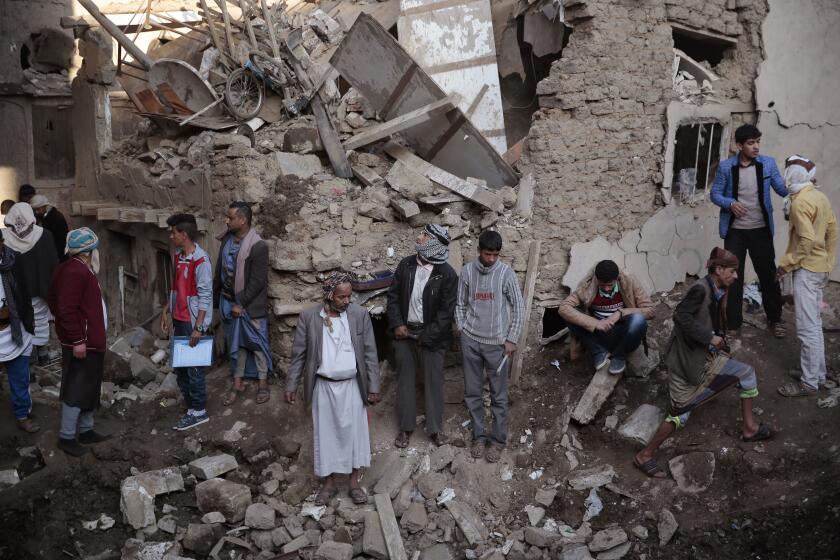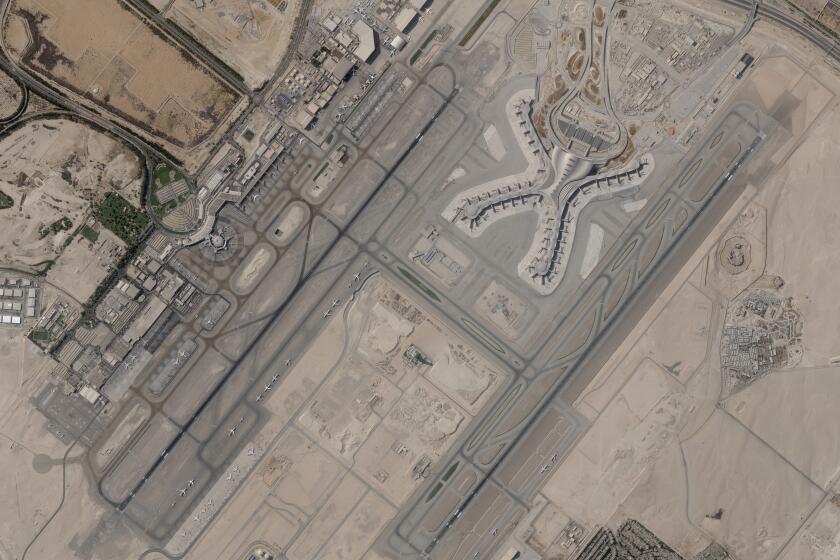Saudi Arabia’s one-sided cease-fire, rejected by Houthi rebels, starts in Yemen

- Share via
DUBAI — A Saudi-led coalition battling the government rebels who hold Yemen’s capital began a unilateral cease-fire Wednesday in the country’s years-long war, even as the Houthi insurgents said they rejected the proposed truce.
The Saudi-proposed pause in fighting began at 6 a.m., a few days ahead of the holy Muslim month of Ramadan. Several similar efforts have failed, and there was no immediate independent confirmation on whether there was truly a break in hostilities between Saudi-led forces and the Houthi rebels.
The cease-fire announcement late Tuesday had raised immediate doubts because the Iran-backed Houthis are skipping an ongoing summit over the war in Saudi Arabia, called by the Saudi-based Gulf Cooperation Council, or GCC, because it’s taking place on their adversary’s territory.
Within hours, Houthi official Mohammed Bukaiti rejected the offer over the continuing closure of Sana’s airport and restrictions on the country’s ports by the Saudi-led coalition.
“If the blockade is not lifted, the declaration of the coalition of aggression to stop its military operations will be meaningless because the suffering of Yemenis as a result of the blockade is more severe than the war itself,” he wrote on Twitter early Wednesday.
The United Nations and others had been pushing the warring sides to reach a truce for Ramadan, as has tenuously occurred in the past. Ramadan is likely to start this weekend, depending on the sighting of the new crescent moon.
Red Cross official urges continued aid for Yemen as global attention focuses on Ukraine.
The GCC, whose members are Bahrain, Kuwait, Oman, Qatar, Saudi Arabia and the United Arab Emirates, began the talks Tuesday in Riyadh, the Saudi capital. On Wednesday, Saudi state TV aired an open portion of the talks live.
GCC Secretary-General Nayef Hajraf welcomed the Yemeni delegations to Riyadh, hailing the talks in his speech as a “breakthrough to move Sana from war to peace.”
“The path to security and peace in Yemen is not impossible, even if the challenges are great,” Hajraf told the vast hall of officials and diplomats. “The success of the Yemeni consultations is not an option, but a duty.”
The U.N. special envoy for Yemen, Hans Grundberg, called the Saudi-led coalition’s cease-fire offer “a step in the right direction” and wished the delegates success in their talks.
Air attack in Abu Dhabi by Houthi rebels sparks the latest escalation in Yemen’s civil war and leaves the U.S. and other nations with limited options.
The summit is expected to continue through April 7.
Yemen’s war began in September 2014, when the Houthis swept into Sana from their northwestern stronghold in Yemen, the Arab world’s poorest country. The Houthis then pushed into exile the government of President Abed Rabbo Mansour Hadi, who was elected in 2012 as the sole candidate after the long rule of Ali Abdullah Saleh.
A Saudi-led coalition, including the UAE, entered the war in March 2015 to try to restore Hadi’s government. But the war stretched into long bloody years, pushing Yemen to the brink of famine.
More than 150,000 people have been killed in the war, according to the Armed Conflict Location and Event Data Project. Those include both fighters and civilians; the most recent figure for the civilian death toll in Yemen’s conflict stands at 14,500.
Saudi airstrikes have killed hundreds of civilians. The Houthis have used child soldiers and indiscriminately laid land mines across the country.
More to Read
Sign up for Essential California
The most important California stories and recommendations in your inbox every morning.
You may occasionally receive promotional content from the Los Angeles Times.











